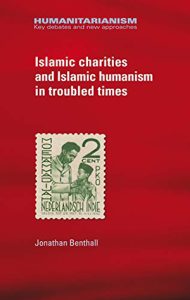Islamic Charities and Islamic Humanism in Troubled Times

Author: Jonathan Benthall
Publisher: Manchester University Press
Year of Publication: 2016
Print Length: 232 pages
Genre: Non-Fiction / Anthropology, Social Science, Religious Studies
Area: Aceh, Indonesia, Mali, Palestine
Topic: Muslim, Muslim World, Islam, Alms, Zakat, Waqf, Charity, Giving, Religion, Ethics & Morality, Humanism, Humanitarian Action & Humanitarianism, Philanthropy, Religious Authority, Religious Institution, Cultural Heritage/Legacy, Culture & Society, Politics & Power, Social Impact, Social Movement, Social Work & Services, Social/Aid Workers, Volunteer & Volunteerism, Colonialism & Post-Colonialism, Tolerance, Violence & Mass Violence, War on Terror
This book is the fruit of twenty years’ reflection on Islamic charities, both practically and as a key to understand the crisis in contemporary Islam. On the one hand, Islam is undervalued as a moral and political force whose admirable qualities are epitomised in its strong tradition of charitable giving. On the other hand, it suffers from a crisis of authority that cannot be blamed entirely on the history of colonialism and stigmatisation to which Muslims have undoubtedly been subjected – most recently, as a result of the “War on Terror”.
The book consists of seventeen previously published chapters, with a general introduction and new prefatory material for each chapter. Part one reviews the current situation of Islamic charities from many different viewpoints. Part two expands the coverage to explore the potential for a twenty-first century global “Islamic humanism” devised by Muslims. This means addressing contentious topics such as religious toleration.
Table of Contents
Acknowledgements
A note on omissions and transliteration
Introduction
PART I: ISLAMIC CHARITIES
1. Islamic charities, Faith-Based Organizations and the international aid system
2. Islamic aid in a North Malian enclave
3. Have Islamic aid agencies a privileged relationship in majority Muslim areas? The case of post-tsunami reconstruction in Aceh
4. The Palestinian zakat committees 1993-2007 and their contested interpretations
5. The Islamic Charities Project (formerly Montreux Initiative)
6. An unholy tangle: Boim versus the Holy Land Foundation
7. The Tariq Ramadan visa case
8. Islamic philanthropy in Indonesia
9. Puripetal force in the charitable field
PART II: ISLAMIC HUMANISM
10. Confessional cousins and the rest: the structure of Islamic toleration
11. Religious persecution and conflict in the twenty-first century
12. What makes Islam unique?
13. Tariq Ramadan
14. Mona Siddiqui
15. Akbar Ahmed
16. Yusuf Al-Qaradawi
17. Religion and violence
Afterword
References
Index

Jonathan Benthall is an Honorary Research Fellow in the Department of Anthropology, University College London and former Director of the Royal Anthropological Institute, where he founded the journal Anthropology Today. His publications include The Best of Anthropology Today (editor, 2002), The Charitable Crescent: Politics of Aid in the Muslim world (with Jérôme Bellion-Jourdan, 2003, new edition 2009), Returning to Religion: Why a Secular Age is Haunted by Faith (2008) and Gulf Charities and Islamic Philanthropy in the ‘Age of Terror’ and Beyond (co-edited with Robert Lacey, 2014). He reviews regularly for the Times Literary Supplement. He has studied the relationship between contemporary Islam and humanitarian aid since 1993, and has published widely on the topic. More broadly, his interests extend on the one hand to the international aid system (including its relationship with modern media), and on the other to the growth of new quasi-religious movements and their interactions with traditional religions.
Source: https://www.e-ir.info/author/jonathan-benthall/ & https://www.ucl.ac.uk/anthropology/people/honorary-staff/jonathan-benthall
More from Jonathan Benthall in this library, click here.
